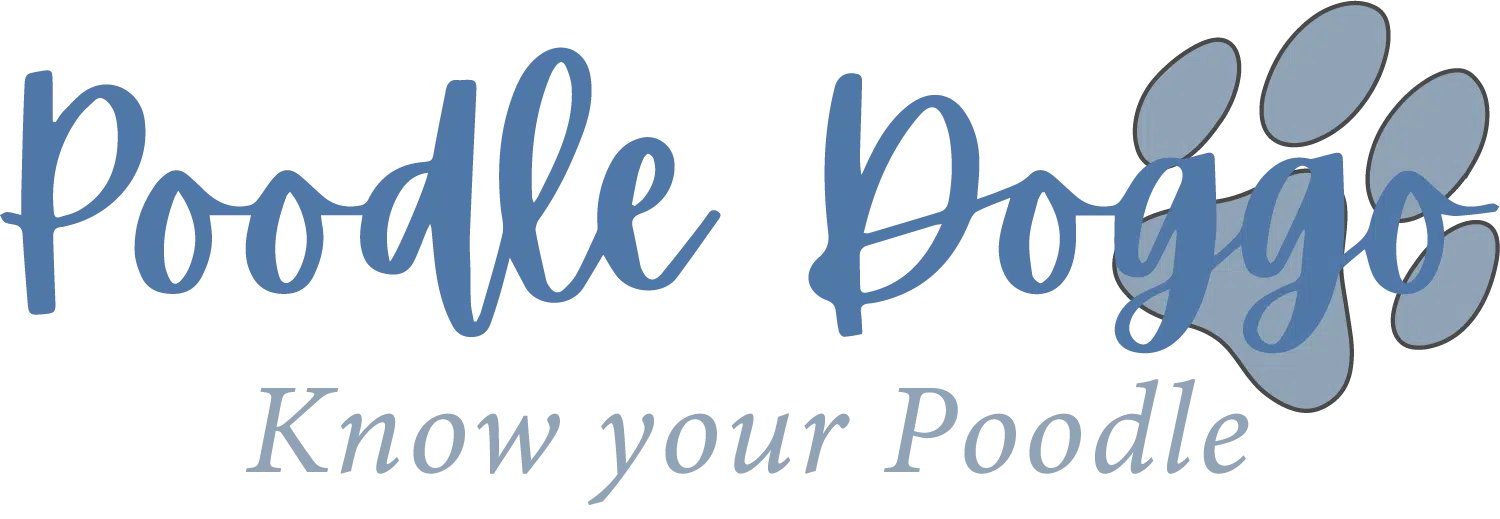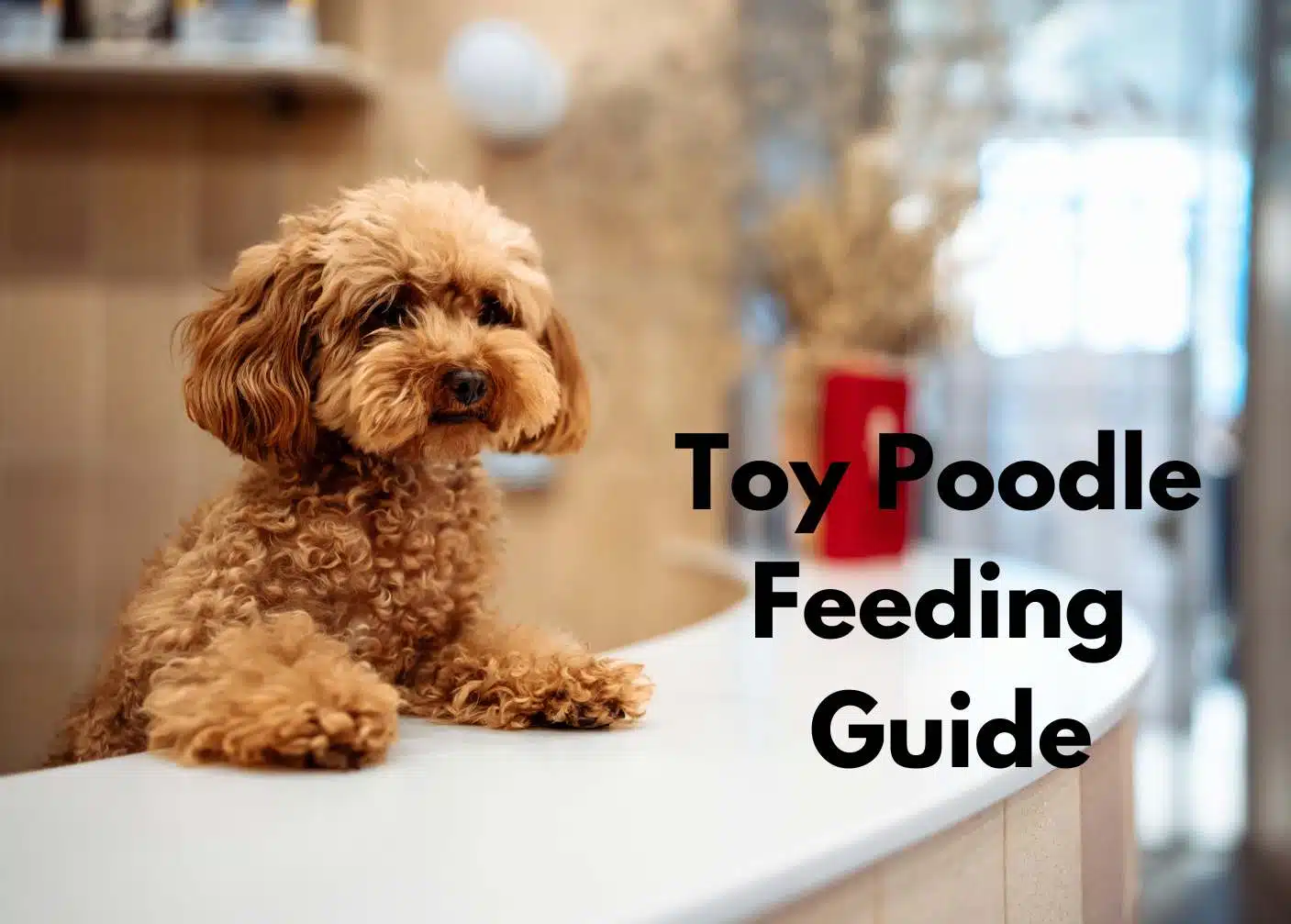Toy poodles are adorable little dogs that make wonderful companions for people of all ages. These small dogs are known for their intelligence, playfulness, and loyalty.
Toy poodles, like all dogs, need quality puppy food to maintain good overall well-being.
One of the most crucial aspects of a toy poodle’s nutrition is “how much food should a toy poodle eat per day?” Feeding your toy poodle too much or too little can lead to health problems, so it’s essential to get it right.
In this article, I’ll discuss the daily caloric intake requirements for a toy poodle and offer advice on giving your dog the balanced diet it needs.
Table of Contents
ToggleHow Much Food Should A Toy Poodle Eat Per Day?
A toy poodle should eat about ¼ to ½ cups of dry dog food a day, split into two meals. It would be best if you didn’t feed them big meals every time. Dogs that are fed once a day may growl because they are hungry.
To ensure they get the same amount, divide it by the number of meals. If your dog is more active than usual, you may feed it more. Your pet shouldn’t be underfed or overfed.

Since every poodle has different feeding needs, the following feeding chart should help you determine how much quantity of food to feed your toy poodle per day according to their weight.
Toy Poodle Feeding Chart
How Many Times To Feed A Toy Poodle Per Day?
There are three options for feeding the Toy Poodle, depending on how often you want to keep your dog provided.
- Free-choice feeding
- Food- restricted feeding
- Time-restricted feeding
These feeding strategies have pros and cons, which will be discussed below.
Free-Choice Feeding
Providing the Toy Poodle with access to food at all times is called free-choice feeding.
Pros
- It saves you time and energy.
- Easier to exhibit.
- It’s more likely that all of your Toy Poodles will get fed if you have many of them.
Cons
- It gets more challenging to regulate your Toy Poodle’s diet.
- You may find it harder to control your Toy Poodle’s calorie intake.
- If you feed your Toy Poodle this manner, it may gain weight quickly.
Food- Restricted Feeding
The Toy Poodle can be fed twice or thrice daily. And toy poodles do best with this feeding routine. Rapidly growing puppies should be fed this way to avoid bone problems, so they grow properly.
Pros
- You have complete control over how much food your pet eats.
- You’ll know straight away if your Toy Poodle’s appetite suddenly shifts.
- Toy Poodle’s weight is easier to manage.
Cons
- You’ll have to deal with your poodle’s mood changes.
- The nutritional requirements of your dog can be challenging to meet.
- Requires you to calculate your Toy Poodle’s food intake.
Time- Restricted Feeding
A third option is to provide your Toy Poodle with access to food for brief periods, approximately 10 minutes, twice a day.
Pros
- You can control your Toy Poodle’s calorie intake to some degree.
- You’ll know any shifts in your Toy Poodle’s eating habits.
- It can help them maintain a healthy body weight.
Cons
- The amount of food your Toy Poodle consumes is out of your hands.
- Your dog’s health may suffer if you feed it in this manner.
- Using this method of feeding requires substantial work on your part.
Best Food For Toy Poodle
The best food for a toy poodle will vary from dog to dog based on factors like the dog’s age, health, activity level, and personal preferences. However, in general, high-quality dog food that is formulated specifically for toy poodles can be a good option.
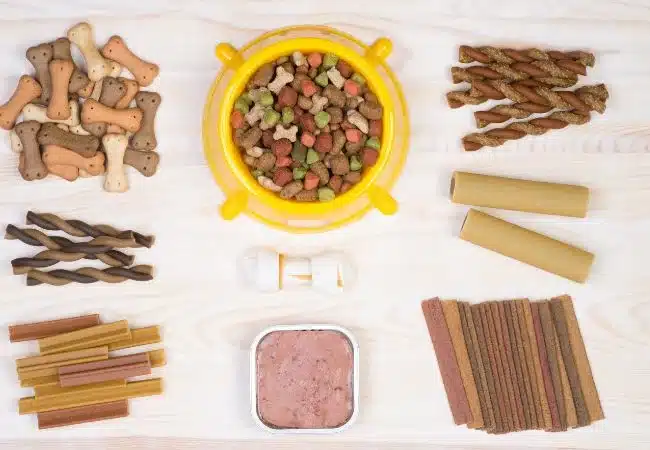
Look for food without fillers, artificial colors, flavors, or preservatives prepared with high-quality, whole-food ingredients.
Also, consider whether or not your toy poodle has any special nutritional needs or health problems.
For instance, some toy poodles may do better on a high-protein diet that encourages muscle growth and maintenance, while others may need a low-fat diet to maintain a healthy weight.
Certified Food For Toy Poodle
Any commercial dog food you feed your Toy Poodle must be approved by AAFCO (Association of American Feed Control Officials).
Experts at AAFCO do extensive testing on adult dog food to guarantee its safety.
In addition, before giving their approval, AAFCO ensures that dog’s diet contains all the nutrients (not just food calories) needed to grow healthily.
Which One Is Better: Kibble Or Wet Food?
Both kibble and wet food can be suitable options for feeding a toy poodle puppy, and the choice ultimately depends on the toy poodle’s age, health, preferences, and activity level.
Generally speaking, feeding kibble will be less expensive than providing wet food and offers health benefits.
Wet or canned food is easier on a dog’s digestive system, but it might lead to poor dental hygiene if the dog never gets to chew on anything dry.
However, wet food can be more expensive and has a shorter shelf life than kibble. Consider increasing your dog’s food budget and paying extra attention to their teeth.
Note: Though dental problems are uncommon in puppies, adult dogs with poor oral health may benefit from wet food, especially after tooth extraction.
What Human Foods Can I Feed My Toy Poodle?
Even though it’s best to feed your dog a balanced diet made just for dogs, there are certain human foods that toy dogs can safely eat in moderation.
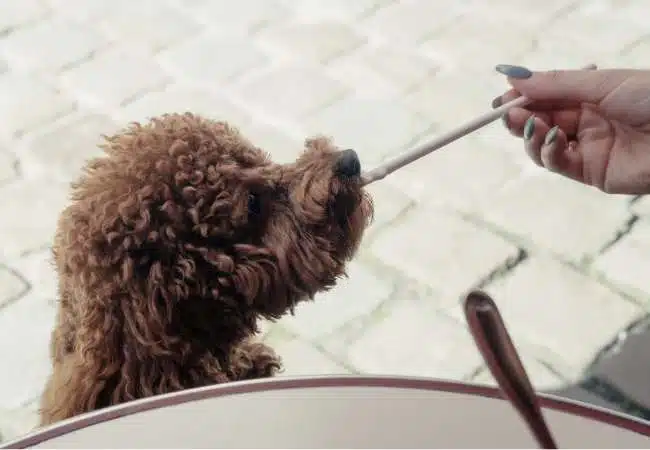
Here are some examples:
- Peanut Butter
- Apples
- Plain Yogurt
- Carrots
- Cooked lean Meat
- Hot Dogs
- Cheese
- Turkey
Note: To avoid giving your toy poodle stomach discomfort, you should introduce new human foods slowly and in small amounts.
Human Foods You Shouldn’t Feed Your Toy Poodle
You should avoid feeding your puppy or adult toy poodle certain types of food, as they can be harmful or even toxic to dogs.
Here are some foods to avoid:
- Caffeine
- Coffee
- Chocolate
- Grapes
- Raisins
- Onions
- Garlic
- Xylitol
Note: It’s also crucial that you keep your toy poodle away from human food that’s heavy in fat, salt, or sugar to prevent obesity, tooth decay, and other health concerns.
What About Treats For Toy Poodles?
Generally, if you feed your dog many treats, you should cut back on how much regular dog food you give it. This will prevent your dog from becoming overweight.
But, regardless of whether they are nutritionally balanced, dog treats still count as good calorie sources for your dog.
Final Thoughts
Hopefully, this article has given you a better idea of how much food should a toy poodle eat per day. Toy poodles should eat 1/4 to 1/2 cups of high-quality dry dog food daily, divided into two meals. Toy poodles’ daily food intake depends on age, weight, and activity level.
Avoid overfeeding your toy poodle since the excess weight in this breed is linked to several health issues. Ensure careful measurements of your dog’s food and avoid offering them table scraps or high-fat, high-sodium, or high-sugar human foods.
Frequently Asked Questions
Q: How much food should a toy poodle eat per day?
A: Most toy poodles should be fed two small meals daily rather than one large meal to help prevent digestive issues and weight gain.
Q: How much should a toy poodle eat per meal?
A: A toy poodle must typically eat about 1/4 to 1/2 cups of high-quality dry dog food per meal.
Q: Can toy poodles eat wet food?
A: Yes, toy poodles can eat wet food if it is a high-quality, balanced diet that meets their nutritional needs. However, wet food can be more costly than dry food.
Q: Can a toy poodle have an egg every day?
A: Eggs are nutritious and safe for toy poodles. They nourish your dog with protein, vitamins, and fatty acids.
Q: Can I feed my toy poodle human food?
A: Cooked lean meats, vegetables, fruits, and eggs are safe for toy poodles. To avoid digestive upset, introduce new human foods slowly and in small amounts.
Q: What happens if you overfeed a puppy?
A: Overeating causes more than weight gain. Soft stool, diarrhea, vomiting, and lethargy can result. It can also produce stomach dilatation-volvulus (bloat) and severe health issues as they age.
References
